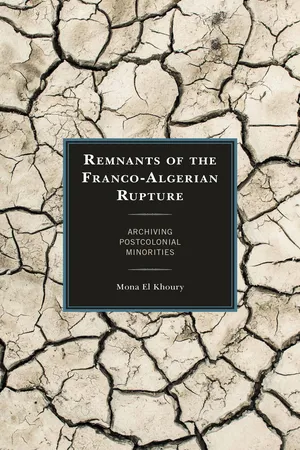
- 317 pages
- English
- PDF
- Available on iOS & Android
eBook - PDF
About this book
At the end of French colonization in Algeria, four categories of people held French citizenship or had strong ties with France: European settlers, Jews, mixed-race individuals, and Harkis. The end of the War of Independence exiled most of them from Algeria, traumatized them in various ways, and transferred many to metropolitan France. Remnants of the Franco-Algerian Rupture: Archiving Postcolonial Minorities examines the legacies of these transnational identities through narratives that dissent from official histories, both in France and Algeria. This literature takes particular stories of exile and loss and constructs a memory around a Mosaic father figure embodying the native land, Algeria. Mona El Khoury argues that these filiation narratives create a postcolonial archive: a discursive foundation that makes historical minorities visible,while disrupting French and Algerian hegemonies. El Khoury questions the power of literature to repair history while contending that these literary strategies seek to do justice to the dead Algerian father, even as they valorize enduring minority identifications.
Frequently asked questions
Yes, you can cancel anytime from the Subscription tab in your account settings on the Perlego website. Your subscription will stay active until the end of your current billing period. Learn how to cancel your subscription.
No, books cannot be downloaded as external files, such as PDFs, for use outside of Perlego. However, you can download books within the Perlego app for offline reading on mobile or tablet. Learn more here.
Perlego offers two plans: Essential and Complete
- Essential is ideal for learners and professionals who enjoy exploring a wide range of subjects. Access the Essential Library with 800,000+ trusted titles and best-sellers across business, personal growth, and the humanities. Includes unlimited reading time and Standard Read Aloud voice.
- Complete: Perfect for advanced learners and researchers needing full, unrestricted access. Unlock 1.4M+ books across hundreds of subjects, including academic and specialized titles. The Complete Plan also includes advanced features like Premium Read Aloud and Research Assistant.
We are an online textbook subscription service, where you can get access to an entire online library for less than the price of a single book per month. With over 1 million books across 1000+ topics, we’ve got you covered! Learn more here.
Look out for the read-aloud symbol on your next book to see if you can listen to it. The read-aloud tool reads text aloud for you, highlighting the text as it is being read. You can pause it, speed it up and slow it down. Learn more here.
Yes! You can use the Perlego app on both iOS or Android devices to read anytime, anywhere — even offline. Perfect for commutes or when you’re on the go.
Please note we cannot support devices running on iOS 13 and Android 7 or earlier. Learn more about using the app.
Please note we cannot support devices running on iOS 13 and Android 7 or earlier. Learn more about using the app.
Yes, you can access Remnants of the Franco-Algerian Rupture by Mona El Khoury in PDF and/or ePUB format, as well as other popular books in Literature & African Literary Criticism. We have over one million books available in our catalogue for you to explore.
Information
Table of contents
- Cover
- Remnants of the Franco-Algerian Rupture
- Series page
- Remnants of the Franco-Algerian Rupture: Archiving Postcolonial Minorities
- Copyright
- Contents
- Acknowledgments
- Chapter 1
- Introduction
- Chapter 2
- From Primal Scenes to the Other(’s) Archive
- Chapter 3
- The Construction of the “Harkive”
- Chapter 4
- The “Métis” Predicament
- Chapter 5
- “Aller Postcolonial—Retour Neocolonial”?
- Conclusion
- Bibliography
- Index
- About the Author